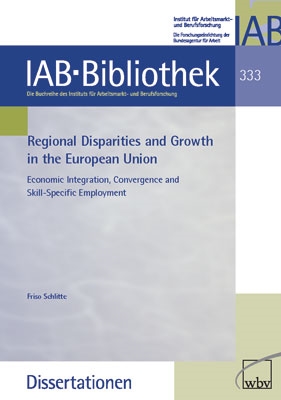Regional Disparities and Growth in the European Union
Economic Integration, Convergence and Skill-Specific Employment
Wirtschaftskraft, Einkommen und Beschäftigung klaffen innerhalb der Europäischen Union (EU) weit auseinander - sowohl innerhalb als auch zwischen den Mitgliedsstaaten. Der Abbau dieses Gefälles ist das erklärte politische Ziel auf europäischer wie nationaler Ebene. Obwohl sich die ökonomische Regionalforschung dieses Themas angenommen hat, liegen bislang kaum gesicherte Erkenntnisse darüber vor, inwieweit die Osterweiterung und die ökonomische Integration der EU die Entwicklung der regionalen Disparitäten beeinflussen. Zudem ist weitgehend ungeklärt, inwiefern und warum sich die Beschäftigungsentwicklung in verschiedenen Qualifikationsniveaus regional unterscheidet. Gestützt auf eine breite Datenbasis und ökonometrische Analysen leistet Friso Schlittes Buch einen wichtigen Beitrag, um diese Forschungslücken zu schließen.
Publikationssprache: Englisch
Publikationssprache: Englisch
Chapter 1 Review of Relevant Studies
1 Introduction
2 Regional Convergence and Economic Integration
2.1 Regional Convergence: Theoretical Considerations
2.2 Concepts of Convergence
2.3 Spatial Autocorrelation
2.4 Regional Disparities in the Enlarged EU
2.5 Economic Integration and Convergence
3 Skill-Specific Employment Growth and the Effects of Local Human Capital and Skill Segregation
3.1 Changes in the Demand for High and Low Skills
3.2 Product Life-Cycles and Functional Specialisation
3.3 Local Human Capital Externalities and Skill Complementarities
3.4 Skill-Specific Employment Growth
3.5 Workplace Segregation by Skill
4 Summary and Outlook
References
Chapter 2 Regional Income Inequality and Convergence Processes in the EU-25
Abstract
1 Introduction
2 Theoretical and Empirical Considerations
3 Dataset and Regional System
4 Development of Regional Disparities in the EU
4.1 Spatial Distribution of Income Levels and Growth
4.2 Between- and Within-Country Inequality
5 Estimation
5.1 ?-Convergence
5.2 Spatial Dependence
5.3 Estimation Results
6 Conclusions
References
Appendix
Chapter 3 EU Enlargement and Convergence - Does Market Access Matter?
Abstract
1 Introduction
2 Theory
2.1 A Two-Country, Three-Region NEG Model
2.2 Effects of Integration
2.3 Implications for EU Enlargement
3 Methodology
3.1 Integration and Market Access
3.2 Integration and Convergence
4 Data and Regional System
5 Empirical Results
5.1 Enlargement and Changes in Market Access
5.2 Regional Convergence in the Enlarged European Union
5.3 Convergence and the Effects of Integration
6 Conclusions
References
Chapter 4 The Determinants of Regional Disparities in Skill Segregation - Evidence from a Cross Section of German Regions
Abstract
1 Introduction
2 Theoretical Background
3 Data
4 Methodological Issues
4.1 Measurement of Skill Segregation
4.2 Regression Analysis
5 Evidence on Regional Differences in Skill Segregation
among German Regions
5.1 Descriptive Overview
5.2 Regression Results
6 Conclusions
References
Chapter 5 Local Human Capital, Segregation by Skill, and Skill-Specific Employment Growth
Abstract
1 Introduction
2 Local Human Capital and Skill Segregation
2.1 Human Capital Externalities and Skill Complementarities
2.2 Human Capital, Skill Segregation and Employment Growth
3 Data
4 Skill Segregation
4.1 Measuring Skill Segregation
4.2 Skill Segregation in West German Regions
5 Regression Model
5.1 Specification
5.2 Results
6 Conclusions
References
Appendix
Chapter 6 Summary and Conclusions
1 Motivation and Common Features of the Chapters
2 Summary of the Chapters
3 Conclusions
References
Abstract
Kurzfassung
1 Introduction
2 Regional Convergence and Economic Integration
2.1 Regional Convergence: Theoretical Considerations
2.2 Concepts of Convergence
2.3 Spatial Autocorrelation
2.4 Regional Disparities in the Enlarged EU
2.5 Economic Integration and Convergence
3 Skill-Specific Employment Growth and the Effects of Local Human Capital and Skill Segregation
3.1 Changes in the Demand for High and Low Skills
3.2 Product Life-Cycles and Functional Specialisation
3.3 Local Human Capital Externalities and Skill Complementarities
3.4 Skill-Specific Employment Growth
3.5 Workplace Segregation by Skill
4 Summary and Outlook
References
Chapter 2 Regional Income Inequality and Convergence Processes in the EU-25
Abstract
1 Introduction
2 Theoretical and Empirical Considerations
3 Dataset and Regional System
4 Development of Regional Disparities in the EU
4.1 Spatial Distribution of Income Levels and Growth
4.2 Between- and Within-Country Inequality
5 Estimation
5.1 ?-Convergence
5.2 Spatial Dependence
5.3 Estimation Results
6 Conclusions
References
Appendix
Chapter 3 EU Enlargement and Convergence - Does Market Access Matter?
Abstract
1 Introduction
2 Theory
2.1 A Two-Country, Three-Region NEG Model
2.2 Effects of Integration
2.3 Implications for EU Enlargement
3 Methodology
3.1 Integration and Market Access
3.2 Integration and Convergence
4 Data and Regional System
5 Empirical Results
5.1 Enlargement and Changes in Market Access
5.2 Regional Convergence in the Enlarged European Union
5.3 Convergence and the Effects of Integration
6 Conclusions
References
Chapter 4 The Determinants of Regional Disparities in Skill Segregation - Evidence from a Cross Section of German Regions
Abstract
1 Introduction
2 Theoretical Background
3 Data
4 Methodological Issues
4.1 Measurement of Skill Segregation
4.2 Regression Analysis
5 Evidence on Regional Differences in Skill Segregation
among German Regions
5.1 Descriptive Overview
5.2 Regression Results
6 Conclusions
References
Chapter 5 Local Human Capital, Segregation by Skill, and Skill-Specific Employment Growth
Abstract
1 Introduction
2 Local Human Capital and Skill Segregation
2.1 Human Capital Externalities and Skill Complementarities
2.2 Human Capital, Skill Segregation and Employment Growth
3 Data
4 Skill Segregation
4.1 Measuring Skill Segregation
4.2 Skill Segregation in West German Regions
5 Regression Model
5.1 Specification
5.2 Results
6 Conclusions
References
Appendix
Chapter 6 Summary and Conclusions
1 Motivation and Common Features of the Chapters
2 Summary of the Chapters
3 Conclusions
References
Abstract
Kurzfassung
weitere Infos
Schlitte, F.: Regional Disparities and Growth in the European Union. Economic Integration, Convergence and Skill-Specific Employment. Bielefeld 2012. DOI: 10.3278/300771w
Schlagworte
- Arbeitsmarktforschung
- Beschäftigung
- Beschäftigungsentwicklung
- Beschäftigungswachstum
- Dissertation
- Einkommen
- Enlarged European Union
- EU Enlargement
- EU Erweiterung
- EU-Osterweiterung
- European Union
- Europäische Union (EU)
- Europäischen Union
- growth
- Import
- Integration
- Konvergenz
- Open Access
- Osterweiterung
- Qualifikationsniveau
- regionale Disparität
- Regionalentwicklung
- Regionalforschung
- Regionalverflechtung
